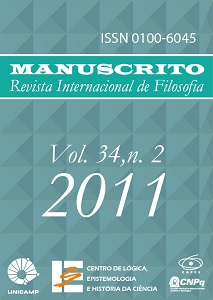Resumo
O artigo investiga a frequente alegação na literatura filosófica de que a concepção de Searle sobre a redução da consciência é incoerente. Após um exame das teses básicas de sua teoria da mente (seção 2), é discutida sua posição a respeito da identidade entre a consciência e a atividade cerebral (seção 3). Da adesão de Searle a uma tese da identidade de ocorrências deve-se concluir que não há contradição entre esta tese e a irredutibilidade ontológica que ele defende. Porém, é possível deduzir de sua teoria asserções que contradizem esta mesma teoria (seção 4), uma vez que essa irredutibilidade resulta em um dualismo de propriedades (seção 5).
Abstract:
The article investigates the frequent assertion in the philosophical literature which affirms that Searle’s conception of the reduction of consciousness is incoherent. After an exam on the basic theses of his theory of mind (section 2), his position concerning the identity between consciousness and brain activity is discussed (section 3). From Searle's adhesion to a token identity thesis, we can conclude that there is no contradiction between this thesis and the ontological irreducibility he defends. However, it is possible to deduce assertions from his theory that contradict this same theory (section 4) once this irreducibility results in a property dualism (section 5).
Keywords: Consciousness, reduction, causal overdetermination, epiphenomenalism.
Referências
CHURCHLAND, P. “Betty Crocker’s Theory” (Review on The Rediscovery of The Mind). London Review of Books. Vol. XVI, Number 9 (12 May), pp. 13-14, 1994.
CORCORAN, K. “The Trouble with Searle’s Biological Naturalism”. Erkenntnis, 55, pp. 307-324, 2001.
CRANE, T. Review on The Rediscovery of The Mind. International Journal of Philosophical Studies Volume 1. Number 2. September, pp. 313- 323, 1993.
CUNNINGHAM, S. What is a Mind?: an Integrative Introduction to the Philosophy of Mind. Indianapolis: Hackett Publishing, 2000.
DENNETT, D. Review on The Rediscovery of The Mind. The Journal of Philosophy 90(4), pp. 193-205, 1993.
GREWENDORF, G.; MEGGLE, G. (eds.). Speech Acts, Mind and Social Reality: Discussions with John R. Searle. Dordrecht, Boston, London: Kluwer Academic Publishers, 2002.
GUTTENPLAN, S. (ed.) A Companion to the Philosophy of Mind. Oxford/Cambridge MA: Basil Blackwell, 1994.
HIEKE, A.; LEITGEB, H. (eds.) Reduction: Between the Mind and the Brain. Frankfurt, Paris, Lancaster, New Brunswick: Ontos Verlag, 2009.
HODGSON, D. “Why Searle has not Rediscovery the Mind”. Journal of Consciousness Studies, 1, nº 2, Winter, pp. 264-274, 1994.
KEMMERLING, A. “Von der Sprache zum Bewusstsein: John R. Searle löst sich vom analytischen Mainstream”. Merkur – deutsche Zeitschrift für europäisches Denken. 48, 5. pp. 432-8, 1994.
KIM, J.; JAKOB, P. et al. “Searle Symposium”. Philosophy and Phenomenological Research. Vol. LV, nº 1, march, pp. 189-232, 1995.
KIM, J. Supervenience and Mind: Selected Philosophical Essays. Cambridge UK: Cambridge University Press, 1993.
KIM, J. Philosophy of Mind. Boulder CO: Westview, 1996.
NAGEL, T. “The Mind Wins!” (Review on The Rediscovery of The Mind). New York Review of Books March 4, pp. 37-41, 1993.
OLAFSON, F. A. “Brain Dualism” (Review on The Rediscovery of The Mind]). Inquiry (37), pp. 253-256, 1994.
PLACE, U. T. “Thirty Years On – Is Consciousness Still a Brain Process?”. Australasian Journal of Philosophy (66) 2, pp. 208-219, 1988.
PRATA, T. A. “Dificuldades da concepção de John Searle sobre a redução da consciência: o problema das capacidades causais”. Princípios, vol. 15, nº 24, pp. 5-29, 2008.
PRATA, T. A. “Irredutibilidade ontológica versus identidade: John Searle entre o dualismo e o materialismo”. O que nos faz Pensar nº 25, pp. 107-124, agosto de 2009.
PRESTON, J.; BISHOP, M. (Eds.) Views into the Chinese Room: New Essays on Searle and Artificial Intelligence. Oxford: Oxford University Press, 2002.
SCHLOSSER, M. E. “Nonreductive Physicalism, Mental Causation, and the Nature of Actions”. In: A. Hieke, H. Leitgeb (eds.) (2009), pp. 73-89.
SCHRÖDER, J. “Searles Auffassung des Verhältnisses Von Geist und Körper und ihre Beziehung zur Identitätstheorie”. Conceptus XXVI, Nr. 66, pp. 97-109, 1992.
SEARLE, J. R. “Minds, Brains and Programms”. Behavioral and Brain Sciences, 3, pp. 417-424, 1980a.
SEARLE, J. R. “Intrinsic Intentionality”. Behavioral and Brain Sciences, 3, pp. 450-457, 1980b.
SEARLE, J. R. Intentionality: a Essay in the Philosophy of Mind. Cambridge: Cambridge University Press, 1983.
SEARLE, J. R. The Rediscovery of the Mind. Cambridge Mass., London: MIT Press, 1992.
SEARLE, J. R.“Searle, John”. In: S. Guttenplan (ed.) (1994), pp. 544- 550.
SEARLE, J. R.“Consciousness, the Brain and the Connection Principle: a Reply”. Philosophy and Phenomenological Research. Vol. LV, nº 1, march, pp. 217-232, 1995.
SEARLE, J. R. Consciousness and Language. Cambridge (UK): Cambridge University Press, 2002a.
SEARLE, J. R.“Why I Am Not a Property Dualist” Journal of Consciousness Studies, 9, nº 12, pp. 57-64, 2002b.
SEARLE, J. R. Mind: a brief introduction. Oxford: Oxford University Press, 2004.
SMITH, B. (Ed.). John Searle. Cambridge: Cambridge University Press, 2003.
SNOWDON, P. F. Review on The Rediscovery of The Mind. The Philosophical Quarterly (44), pp.259-260, 1994.
STEWARD, H. The Ontology of Mind: Events, Processes, and States. Oxford: Oxford University Press, 2003.
STICH, S.P. Review on Minds, Brains and Science. The Philosophical Review (96), pp.129-133, 1987.
TSOHATZIDIS, (Ed.) John Searle’s Philosophy of Language: Force, Meaning and Mind. Cambridge: Cambridge University Press, 2007.
VANDERVEKEN, D. et. al. Revue Internationale de Philosophie 2, nº 217, pp. 165-297, 2001.

